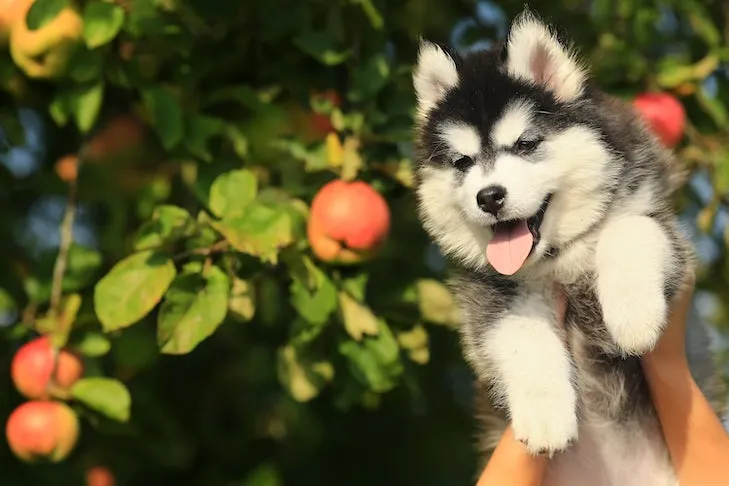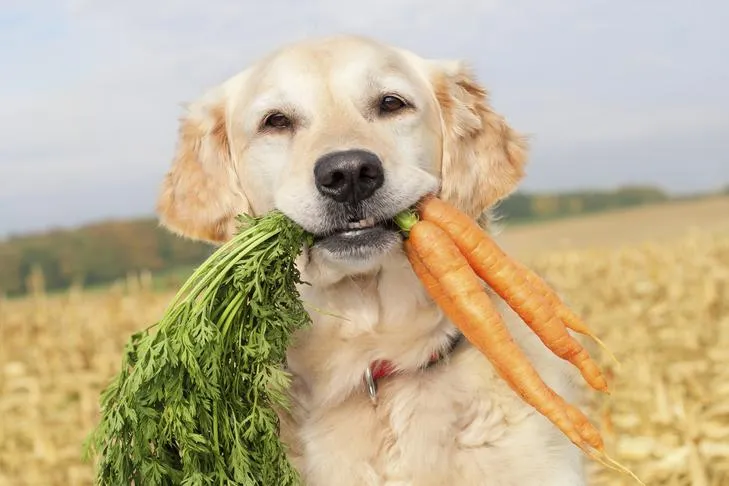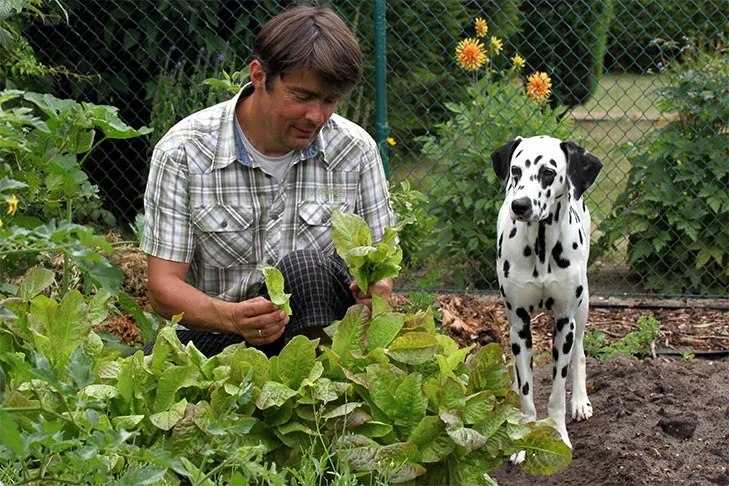As a loving dog owner, it’s natural to want to share your favorite human snacks with your furry companion. However, while some human foods are perfectly safe and even beneficial for dogs, many others can be unhealthy, or even downright dangerous. When it comes to fruits, understanding What Fruits Are Not Good For Dogs is crucial for ensuring your pet’s long-term health and well-being. Dogs digest foods differently than humans, and inadvertently feeding them the wrong fruits can lead to severe health problems, including acute kidney failure or other life-threatening conditions. While dogs, being omnivores, don’t strictly require fruits and vegetables in their diet, dog-safe options can serve as excellent, healthy treats in moderation. what fruits not good for dogs This comprehensive guide will help you navigate the world of fruits and vegetables, highlighting which ones are safe to share and, more importantly, which ones should be strictly avoided to protect your beloved canine.
Fruits Dogs Can Enjoy Safely
Many fruits can be a delicious and healthy addition to your dog’s diet when offered in moderation. These natural treats provide essential vitamins, minerals, and antioxidants, contributing to your dog’s overall health. Remember always to prepare them properly by removing any seeds, pits, or tough skins before serving.
Apples
Apples are a fantastic source of vitamins A and C, along with beneficial fiber, making them an excellent snack for your dog. Their low protein and fat content also makes them ideal for senior dogs. Always remove the core and seeds, as apple seeds contain small amounts of cyanide. For a refreshing treat, especially during warmer weather, try freezing apple slices. Many commercial dog treats also incorporate apples as a healthy ingredient.
Bananas
Bananas, in moderation, offer a great low-calorie treat for dogs, rich in potassium, various vitamins, biotin, fiber, and copper. They are also low in cholesterol and sodium. However, due to their higher sugar content, bananas should be given sparingly as a treat rather than a regular part of their main diet. You can also find readily available banana dog treats that offer the same benefits without the mess.
Blueberries
Often hailed as a superfood for both humans and canines, blueberries are packed with antioxidants that help prevent cell damage. They are also rich in fiber and phytochemicals. Blueberries are small enough to be a fantastic training treat or a fun snack for dogs learning to catch food mid-air. Their nutritional punch makes them a popular ingredient in many specialized dog treats, sometimes combined with other healthy components like yogurt.
Cantaloupe
This hydrating melon is loaded with nutrients, low in calories, and provides a good source of water and fiber. However, cantaloupe is high in sugar, so it should be offered in moderation, particularly for dogs who are overweight or managing diabetes. Freezing small cubes or balls of cantaloupe can create a delightful and refreshing enrichment snack for your dog during hot summer days.
Cranberries
Both fresh and dried cranberries are safe for dogs in small quantities, though their tart taste might not appeal to all canines. As with any treat, moderation is key, as too many cranberries can lead to an upset stomach. It’s important to note that many dried cranberries for human consumption are sweetened, adding unnecessary sugar to your dog’s diet. Opt for unsweetened fresh or frozen cranberries, or consider crunchy cranberry dog treats designed specifically for pets.
Cucumbers
Cucumbers are an excellent choice for overweight dogs as they contain almost no carbohydrates or fat, and are full of hydrating water. They are also loaded with vitamins K, C, and B1, as well as potassium, copper, magnesium, and biotin. Cool cucumber slices make an excellent hot weather treat, and you can even freeze them for an extra fun enrichment snack that helps keep your dog cool.
 Russell Terrier with cucumber slices on its eyes and head for a funny portrait.
Russell Terrier with cucumber slices on its eyes and head for a funny portrait.
Mango
This sweet and juicy tropical fruit is a good source of vitamins A, B6, C, and E, along with potassium, beta-carotene, and alpha-carotene. As with most fruits, it’s vital to remove the hard pit first, as it contains small amounts of cyanide and poses a significant choking hazard. Mango is high in sugar, so it should be given as an occasional treat, especially for dogs who are prone to weight gain. For a less messy way to provide mango’s benefits, look for chewy mango dog treats.
Oranges
Veterinarians generally agree that oranges are fine for dogs to eat, although many dogs may be deterred by their strong citrus smell or taste. Oranges are an excellent source of vitamin C, potassium, and fiber. In small quantities, the juicy flesh can be a tasty treat. Vets recommend peeling the orange and removing any seeds, offering only the flesh, as the peel is rough on their digestive systems and its oils can be off-putting. If your dog doesn’t enjoy fresh citrus, several dog treats contain orange as an ingredient.
Peaches
Small amounts of cut-up fresh or frozen peaches are a great source of fiber and vitamin A. However, like cherries, peach pits contain cyanide. Ensure you completely cut the flesh away from the pit and dispose of pits securely in a dog-safe trash receptacle. Avoid canned peaches, which typically contain high amounts of sugary syrups, even those labeled “in natural juice.” Frozen peach slices can be a fun, cooling enrichment snack.
 Siberian Husky puppy being held in front of an apple tree, looking curious.
Siberian Husky puppy being held in front of an apple tree, looking curious.
Pears
Pears are a healthy snack for dogs, rich in copper, vitamins C and K, and fiber. When sharing pears, always cut the flesh into bite-sized chunks and remove the pit and seeds, as pear seeds contain traces of cyanide. Similar to peaches, avoid canned or jarred pears with sugary syrups. Many dog treats also feature pear, sometimes combined with other functional ingredients like duck or salmon.
Pineapple
A few chunks of pineapple can be a delightful sweet treat for dogs, provided the prickly outer peel and crown are thoroughly removed. This tropical fruit is packed with vitamins, minerals, and fiber. It also contains bromelain, an enzyme that can aid dogs in absorbing proteins. As with other fruits, avoid canned or packaged pineapple in sweetened syrups, as added sugars are unnecessary and can contribute to canine obesity. Pineapple-flavored dog treats are also available for a convenient island-inspired snack.
Pumpkin
Pure pumpkin is a highly beneficial food for dogs. It’s full of antioxidants, and famously effective in helping to relieve both diarrhea and constipation in dogs. If purchasing canned pumpkin, always choose 100% pumpkin puree, avoiding pumpkin pie filling which contains added sugars and spices. You can also roast fresh pumpkin in the oven and feed the peeled flesh to your dog. Many pumpkin supplements and dog treats are also available to provide these digestive benefits.
Raspberries
Raspberries are safe for dogs in moderation and contain beneficial antioxidants. They are low in sugar and calories but high in fiber, manganese, and vitamin C. Raspberries are particularly good for senior dogs due to their anti-inflammatory properties, which can help support aging joints. It’s important to limit your dog to no more than 8 ounces of fresh or frozen raspberries, as they contain small, naturally occurring amounts of xylitol, which is toxic to dogs in large quantities.
Strawberries
Strawberries are rich in fiber and vitamin C, and even contain an enzyme that can help whiten your dog’s teeth. Like all fruits, strawberries contain natural sugars, so offer them in moderation. Frozen strawberries can be a fun enrichment treat. Alternatively, you can use strawberry-flavored training treats hidden in a snuffle mat for a mentally stimulating activity.
Watermelon
Dogs can enjoy watermelon, but it’s crucial to remove the rind and seeds first, as these can cause intestinal blockages. The watermelon flesh itself is safe and packed with vitamins A, B-6, and C, as well as potassium. Being 92% water, it’s an excellent way to help keep your dog hydrated on warm summer days. Freezing chunks of seeded watermelon makes for a fantastic hot-weather enrichment treat, and watermelon-flavored dog treats are also an option.
Fruits Dogs Should Absolutely Avoid
While some fruits offer wonderful benefits, others contain compounds, seeds, or parts that are dangerous, if not toxic, to dogs. It is imperative to keep these fruits completely out of your dog’s reach to ensure their safety and prevent potential health crises. Understanding what fruits should not be given to dogs can prevent emergency vet visits. what fruits should not be given to dogs
Avocado
Although avocado is a healthy snack for humans, it should never be given to dogs. The pit, skin, and leaves of avocados contain persin, a toxin that frequently causes vomiting and diarrhea in dogs. While the fleshy inside of the avocado fruit has less persin, it can still be too much for a dog’s sensitive system. Furthermore, avocado flesh is high in fat, which can lead to gastrointestinal upset or contribute to serious conditions like pancreatitis if consumed in excess. You can still provide the benefits of avocado to your dog by choosing dog treats formulated for skin and coat health that include avocado as an ingredient.
Cherries
With the exception of the fleshy fruit directly surrounding the seed, all parts of cherry plants contain cyanide and are highly toxic to dogs. Cyanide disrupts cellular oxygen transport, meaning your dog’s blood cells cannot adequately receive oxygen. If you have a cherry tree in your yard, ensure your dog does not have access to fallen fruit. Should your dog ingest whole cherries or cherry pits, immediately watch for signs such as dilated pupils, difficulty breathing, or red gums, as these are indicators of cyanide poisoning, a veterinary emergency. When enjoying cherries yourself, always dispose of pits in a dog-proof trash can, and educate children about the dangers of sharing cherries or their pits with pets. what fruits and veggies are not good for dogs
Grapes
If you suspect your dog has eaten grapes or raisins, contact your veterinarian immediately. Grapes and raisins are intensely toxic to dogs, regardless of breed, sex, or age. Their ingestion can lead to acute kidney failure. Always be extremely vigilant about this dangerous fruit, especially if grapes or raisins are present in your home, perhaps due to children’s snacks. Ensure that any discarded grapes or raisins are placed in a dog-proof trash receptacle, away from curious paws.
Tomatoes
While the ripened flesh of the tomato fruit is generally considered safe for dogs, the green parts of the tomato plant, including stems and leaves, contain a toxic substance called solanine. Although a dog would typically need to consume a large quantity of the plant to become sick, it’s safer to avoid feeding tomatoes altogether to eliminate any risk. If your dog enjoys exploring your garden, take precautions to prevent them from accessing tomato plants.
 Rottweiler laying in a yard with its head tilted.
Rottweiler laying in a yard with its head tilted.
Vegetables Dogs Can Enjoy Safely
Just like fruits, many vegetables can offer nutritional benefits for your dog. It’s important to know which ones are safe to share and how to prepare them correctly.
Broccoli
Broccoli can be safely eaten by dogs in small amounts, best offered as an occasional treat. It’s high in fiber and vitamin C and low in fat. However, broccoli florets contain isothiocyanates, which can cause mild to potentially severe gastric irritation in some dogs if consumed in large quantities. The tough stalks have also been known to cause esophageal obstructions. If your dog enjoys broccoli, cooking it can help mitigate these issues.
Brussels Sprouts
Packed with nutrients and antioxidants, Brussels sprouts are beneficial for both humans and dogs. However, avoid overfeeding them to your dog, as they are notorious for causing excessive gas. If your dog is a big fan and you can tolerate the side effects, consider dehydrated dog foods that include these leafy greens.
Carrots
Carrots are an excellent, low-calorie snack, rich in fiber and beta-carotene, which converts to vitamin A. The crunchy texture of carrots also helps clean your dog’s teeth. Carrots are a common ingredient in many dog foods and numerous carrot-flavored dog treats.
 Golden Retriever gently holding several fresh orange carrots in its mouth.
Golden Retriever gently holding several fresh orange carrots in its mouth.
Celery
Beyond vitamins A, B, and C, celery contains nutrients that promote a healthy heart and may even help fight cancer. An added bonus is that celery is known to help freshen doggy breath. Many dog chews incorporate celery for these benefits.
Green Beans
Whether chopped, steamed, raw, or canned (plain, no salt added), all types of green beans are safe for dogs. They are packed with important vitamins and minerals, high in fiber, and low in calories, making them a healthy addition to your dog’s diet. Frozen green beans can also serve as a fun enrichment snack.
Peas
Green peas, snow peas, sugar snap peas, and garden or English peas are all acceptable for dogs on occasion. Peas offer several vitamins, minerals, and are rich in protein and fiber. You can feed your dog fresh or frozen peas, but always avoid canned peas with added sodium.
Spinach
Dogs can eat spinach, but it’s not among the top recommended vegetables due to its high oxalic acid content. Oxalic acid can block the body’s ability to absorb calcium and potentially lead to kidney damage. While a dog would likely need to consume a very large amount to experience problems, choosing other vegetables is generally safer. If you wish to provide some of the leafy green’s benefits, consider spinach dog treats for an occasional snack.
 Dalmatian dog observing a person gardening and picking green leaves in a garden.
Dalmatian dog observing a person gardening and picking green leaves in a garden.
Vegetables Dogs Should Absolutely Avoid
While many vegetables are a healthy addition to a dog’s diet, others can be toxic or harmful. Ensuring these vegetables do not make their way into your dog’s bowl is crucial for their safety.
Asparagus
Asparagus isn’t inherently unsafe for dogs, but it offers minimal nutritional benefit. It’s too tough to be eaten raw, and by the time it’s cooked soft enough for dogs to consume, much of its nutritional value is lost. If you want to share a vegetable with your dog, there are many other more beneficial options.
Mushrooms
Wild mushrooms can be highly toxic to dogs. While only a small percentage of mushroom species are poisonous, those that are can cause severe harm or even be fatal. It is always best to avoid feeding your dog any wild mushrooms. Washed mushrooms purchased from a supermarket for human consumption are generally safe, but if in doubt, it’s best to avoid them or consult your vet.
Onions
Dogs should never, under any circumstances, eat onions. If you suspect your dog has ingested onions, contact your veterinarian immediately. Onions, along with leeks and chives, belong to the Allium family of plants, which are poisonous to most pets, especially cats. Consuming onions can lead to the rupture of your dog’s red blood cells, as well as cause vomiting, diarrhea, stomach pain, and nausea. Onion poisoning is particularly severe in Japanese breeds like Akitas and Shiba Inus, but all dogs are highly susceptible. Ensure children do not share onion-containing foods with your dog, and secure leftovers where your dog cannot access them.
Conclusion
Understanding which fruits and vegetables are safe, and particularly what fruits are not good for dogs, is fundamental to responsible pet ownership. While a variety of fruits and vegetables can offer healthy, delicious treats for your canine companion, certain ones contain toxic compounds that can lead to severe illness or even death. Always err on the side of caution, preparing safe produce properly by removing pits, seeds, and rinds, and offering treats in moderation. For specific dietary concerns or if you suspect your dog has consumed a toxic food, always consult your veterinarian promptly. Your diligence ensures your dog stays happy, healthy, and safe, enjoying a long life by your side. Explore more articles on Dog Care Story to keep your furry friend thriving!
